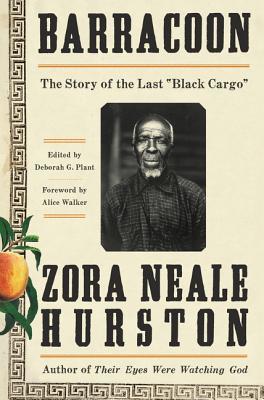 Barracoon: The Story of the Last “Black Cargo” by Zora Neale Hurston, Deborah G. Plant
Barracoon: The Story of the Last “Black Cargo” by Zora Neale Hurston, Deborah G. Plant Published by Amistad on May 8, 2018
Genres: History, Nonfiction
Pages: 171
Format: Hardcover
Buy on Amazon, Buy on Bookshop
This post contains affiliate links you can use to purchase the book. If you buy the book using that link, I will receive a small commission from the sale.
Goodreads
In 1927, Zora Neale Hurston went to Plateau, Alabama, just outside Mobile, to interview eighty-six-year-old Cudjo Lewis. Of the millions of men, women, and children transported from Africa to America as slaves, Cudjo was then the only person alive to tell the story of this integral part of the nation’s history. Hurston was there to record Cudjo’s firsthand account of the raid that led to his capture and bondage fifty years after the Atlantic slave trade was outlawed in the United States.
In 1931, Hurston returned to Plateau, the African-centric community three miles from Mobile founded by Cudjo and other former slaves from his ship. Spending more than three months there, she talked in depth with Cudjo about the details of his life. During those weeks, the young writer and the elderly formerly enslaved man ate peaches and watermelon that grew in the backyard and talked about Cudjo’s past—memories from his childhood in Africa, the horrors of being captured and held in a barracoon for selection by American slavers, the harrowing experience of the Middle Passage packed with more than 100 other souls aboard the Clotilda, and the years he spent in slavery until the end of the Civil War.
Offering insight into the pernicious legacy that continues to haunt us all, black and white, this work is an invaluable contribution to our shared history and culture.
This book is such a valuable record. It’s wonderful that it has come to light at long last, and I’m so glad it exists. I first heard about the Clotilda on an episode of Finding Your Roots, hosted by Dr. Henry Louis Gates, Jr. The show’s genealogists uncovered that Questlove descended from Charles Lewis, one of the 125 people captured, enslaved, and brought to the United States on the Clotilda. This ship was the last ship to bring enslaved Africans to the United States in 1860. While the slave trade had been abolished, it didn’t stop the illegal trafficking of enslaved people, and of course, slavery had not yet ended in the United States. The men responsible for trafficking the people brought to the United States aboard the Clotilda were never punished for the crime.
Netflix currently has a documentary, Descendant, about the Clotilda descendants in Africatown, Alabama.
We now know that two other survivors of the Clotilda outlived Cudjo Lewis, but when Hurston interviewed him, he was believed to be the last person alive to have survived the Middle Passage. She captured video footage of Cudjo Lewis, a powerful documentation of the legacy of slavery.
I appreciated the opportunity to read this first-hand account of Cudjo Lewis’s story and am grateful to all those who brought his story to light.